Overview
In the ever-changing world of web development, selecting the right backend technology is paramount for crafting scalable, efficient, and high-performance applications. In this dynamic landscape, two heavyweight contenders, PHP and Node.js, vie for developers’ attention.
Both PHP and Node.js stand as robust options for backend development, yet the developer community finds itself at a crossroads when deciding between the two. PHP, with a rich history, has long been a mainstay in web development. Conversely, Node.js emerges as a modern contender, introducing JavaScript to the realm of backend programming.
In this detailed comparison, we embark on a journey to uncover the strengths and weaknesses of PHP and Node.js, guiding you to an informed decision based on your project’s unique demands.
PHP: A Cornerstone of Web Development
Conceived by Rasmus Lerdorf in 1993, PHP evolved from its humble beginnings as a “Personal Home Page” to the powerful “PHP: Hypertext Preprocessor.” It gained prominence in the Linux, Apache, MySQL, and PHP (LAMP) stack, catalyzing dynamic web-based application development. PHP’s influence is evident, with over 70% of existing websites leveraging its capabilities.
Popular Websites using PHP
Node.js: A JavaScript Renaissance on the Server
Born in 2009 through Ryan Dahl’s vision, Node.js revolutionized backend development by introducing server-side JavaScript. Widely adopted by tech giants like Netflix and PayPal, Node.js facilitates fast, scalable, and efficient backend applications. Its asynchronous, event-driven architecture empowers front-end developers to seamlessly transition to full-stack roles.
Popular Websites using Node.js
PHP vs Node.js: A Comparative Analysis
Let’s conduct a direct 1:1 comparison of the two major players in backend development to gain deeper insights and determine the superior tool.
- Ease of Use:
- PHP: Renowned for simplicity, PHP’s C-style syntax and extensive standard library make it accessible.
- Node.js: Familiarity with JavaScript contributes to Node.js’s ease of use, supported by a straightforward syntax and a rich ecosystem.
- Performance:
- PHP: Processes requests synchronously, potentially facing challenges with high concurrency.
- Node.js: Asynchronous nature enables concurrent request handling, making it efficient for real-time applications.
- Documentation and Community Support:
- PHP: Boasts a vast, well-established community with extensive documentation and support.
- Node.js: Growing community, coupled with comprehensive documentation, fosters continuous support and innovation.
- Architecture:
- PHP: Suited for traditional web applications, deploys a multi-threaded, blocking architecture.
- Node.js: Excels with a single-threaded, non-blocking architecture, ideal for high-concurrency and real-time updates.
- Ecosystem and Libraries:
- PHP: Mature ecosystem with popular frameworks like Laravel, Symfony, and CodeIgniter.
- Node.js: Vibrant ecosystem, npm-centric, featuring frameworks like Express.js and Nest.js for flexibility and scalability.
- Databases:
- PHP: Partners well with traditional databases; MySQL is prevalent but susceptible to certain vulnerabilities.
- Node.js: Strong compatibility with NoSQL databases like MongoDB, enhancing scalability and resistance to certain attacks.
- Web Servers:
- PHP: Requires setup in LAMP or XAMPP, but PHP v5.4 onwards includes a built-in development server.
- Node.js: Inherent capabilities for developing customized web servers, aided by frameworks like Express.js and koa.js.
- Frameworks:
- PHP: Abundance of frameworks like Laravel and CodeIgniter, facilitating agile and secure backend development.
- Node.js: Express.js, Meteor, and Derby headline a dynamic list of frameworks, promoting flexibility and real-time application development.
- Modules:
- PHP: Leverages PEAR and Composer for module management, ensuring efficient dependency handling.
- Node.js: Boasts NPM (Node Package Manager) for seamless package management, enhancing code modularity.
Statistics of PHP and Node.js
Usage statistics of server-side programming languages for websites
Credit: W3Techs
Comparison of the usage statistics of PHP vs. JavaScript for websites
Credit: W3Techs
Usage broken down by ranking
Credit: W3Techs
PHP and Node.js Use Cases
PHP and Node.js share similarities, yet their distinct strengths make them suited for specific project needs. Let’s delve into common use cases to guide your technology choice.
- Security:
- PHP: Optimal for projects requiring stringent security and compliance, especially in fintech applications handling sensitive user data. PHP incorporates built-in security features like input sanitization and output encoding, coupled with a history of regular updates for maintaining application security.
- Real-Time Applications:
- Node.js: Ideal for projects demanding real-time communication, such as chat applications, multiplayer games, or collaborative tools. Node.js comes equipped with built-in WebSockets support and a diverse ecosystem of libraries, simplifying the development of real-time applications.
- Support for Legacy Code or Systems:
- PHP: Being the older technology, PHP enjoys broad support across various platforms and environments. This makes it a seamless choice for integrating with older or legacy systems, ensuring compatibility with existing PHP code or frameworks.
- Strong Support for Non-Relational Databases:
- Node.js: Excelling in projects requiring non-relational databases, Node.js offers robust support and a plethora of libraries for working with NoSQL databases. This is beneficial for applications needing flexible and scalable data storage beyond traditional relational structures.
- Strong Support for Content Management Systems (CMS):
- PHP: The go-to choice for projects integrating CMS, as popular systems like Drupal and WordPress are built with PHP. PHP allows seamless integration and customization of CMS to align with the unique needs of your project.
- Support for Modern JavaScript Features:
- Node.js: Tailored to support the latest JavaScript frameworks, Node.js, built on the V8 JavaScript engine, regularly incorporates cutting-edge features and improvements. This inherent design makes Node.js an excellent choice for projects leveraging modern JavaScript capabilities.
Advantages and Disadvantages
Advantages of PHP:
- Robust security features.
- Regular feature updates.
- Strong CMS support.
- Wide support for frameworks, servers, and platforms.
- Abundance of web development tools and libraries.
Disadvantages of PHP:
- Less dynamic than some languages.
- Slower performance for certain applications.
- Global namespace challenges for large codebases.
Advantages of Node.js:
- Efficient performance.
- Dynamic and flexible for concurrent programming.
- Seamless transition for front-end developers.
- Built-in support for WebSockets.
- Ideal for microservices and serverless functions.
Disadvantages of Node.js:
- Less suitable for graphics-intensive web applications.
- Limited built-in security features.
- Reduced compatibility with legacy systems.
- CMS support is not as robust.
Future Outlook
Future of PHP:
In 2024, PHP’s trajectory appears promising with the release of PHP 8. Its vibrant community and compatibility with modern technologies position PHP as a reliable choice for web development. Legacy code support and ongoing updates underscore its continued relevance.
Future of Node.js:
Node.js remains at the forefront of server-side development, catering to scalability and real-time application needs. With an active community, robust ecosystem, and commitment to modern practices, Node.js is poised for sustained growth in microservices, serverless computing, and IoT applications.
Conclusion: Choosing the Right Tool for the Job
In conclusion, the choice between PHP and Node.js depends on the specific requirements of your project. If you are working on a content-centric website or have extensive experience with PHP, it remains a solid choice. On the other hand, if you are developing real-time applications or favour a unified language (JavaScript) for both frontend and backend, Node.js might be the better fit.
Ultimately, both PHP and Node.js have their strengths and can be powerful tools in the hands of skilled developers. Consider the nature of your project, your team’s expertise, and the specific features you require to make the right choice for your web development endeavours.
In the battle of PHP vs Node.js, the winner is the one that aligns with your project goals and development philosophy. Choose wisely, and happy coding!
FAQs on PHP vs Node.js
The choice depends on project requirements. Node.js excels in real-time applications, while PHP is ideal for traditional web development. Consider scalability, development speed, and your team’s skill set for an informed decision.
Opt for Node.js in real-time applications, where scalability and concurrent connections are crucial. Its non-blocking, event-driven nature is perfect for scenarios requiring a unified JavaScript stack.
PHP is well-suited for traditional web applications and content-centric sites. Its simplicity, fast development cycles, and robust frameworks like Laravel make it an excellent choice.
- Node.js has maintained popularity due to its scalability and versatility. Its growth is anticipated beyond 2024, especially in startups requiring efficient and reliable backend solutions.
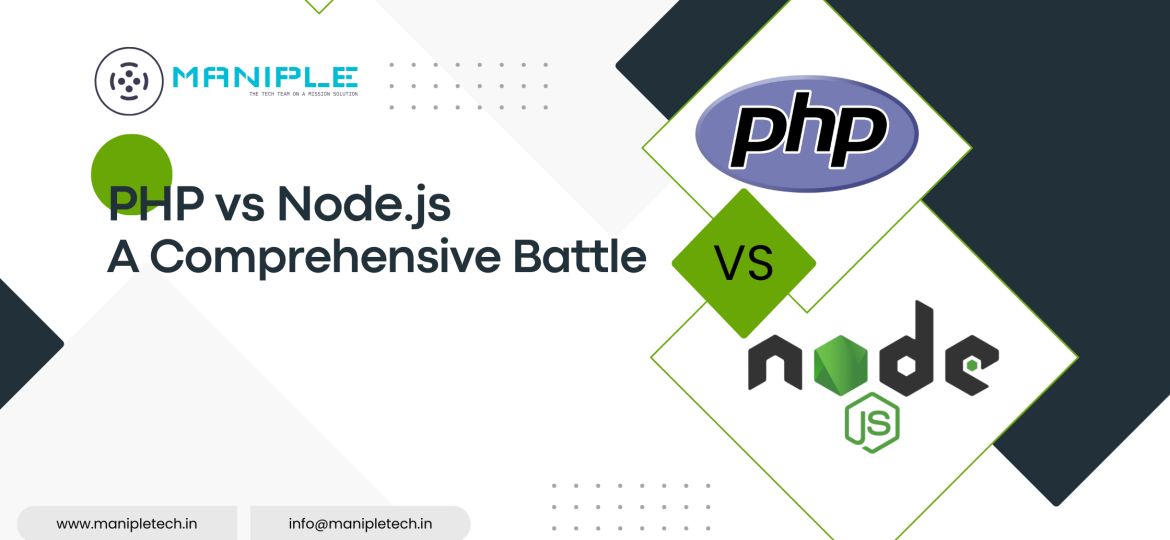


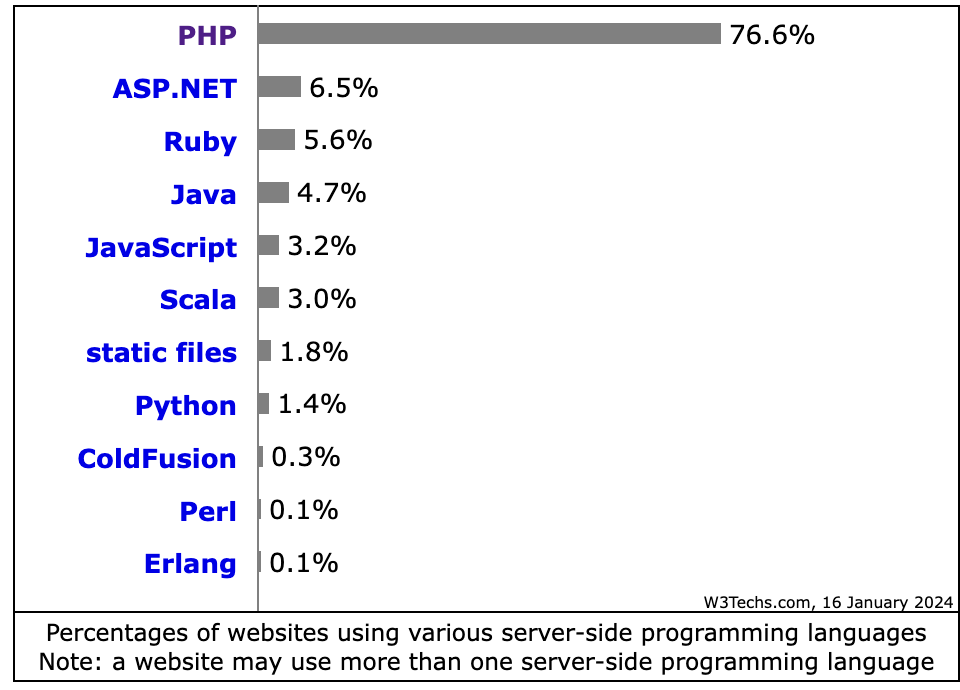

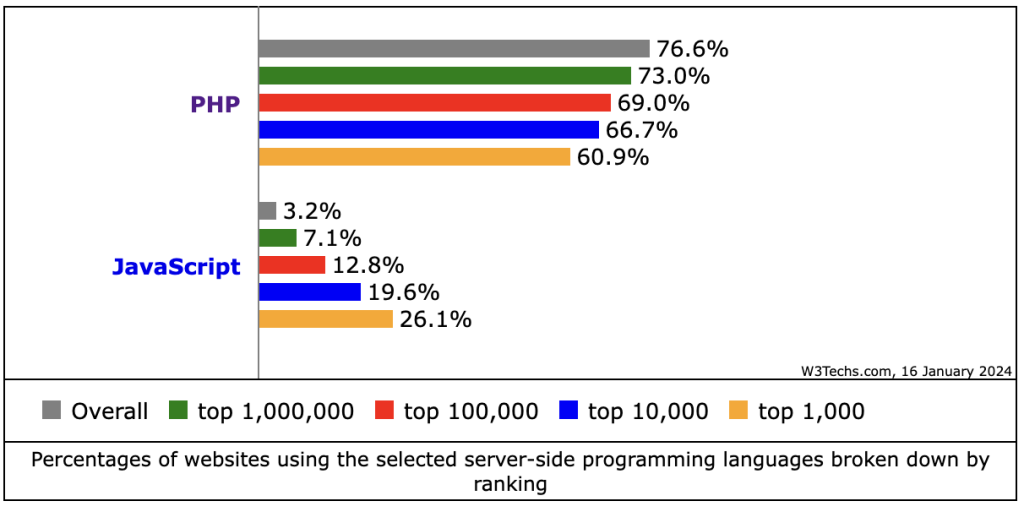








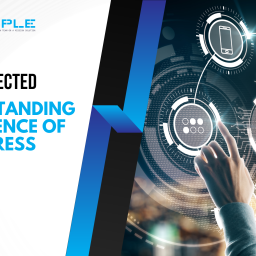



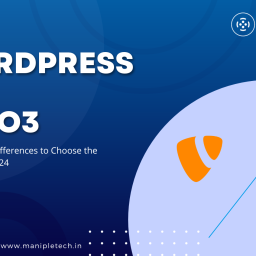


Thank you for your sharing. I am worried that I lack creative ideas. It is your article that makes me full of hope. Thank you. But, I have a question, can you help me?
helloI really like your writing so a lot share we keep up a correspondence extra approximately your post on AOL I need an expert in this house to unravel my problem May be that is you Taking a look ahead to see you
Somebody essentially help to make significantly articles Id state This is the first time I frequented your web page and up to now I surprised with the research you made to make this actual post incredible Fantastic job
Hi my loved one I wish to say that this post is amazing nice written and include approximately all vital infos Id like to peer more posts like this
Ive read several just right stuff here Certainly price bookmarking for revisiting I wonder how a lot effort you place to create this kind of great informative website